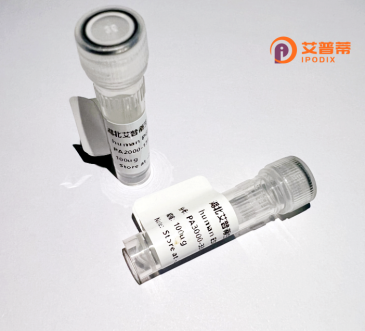
| 纯度 | >90%SDS-PAGE. |
| 种属 | Human |
| 靶点 | TMEM88 |
| Uniprot No | Q6PEY1 |
| 内毒素 | < 0.01EU/μg |
| 表达宿主 | E.coli |
| 表达区间 | 1-159 aa |
| 活性数据 | MADVPGAQRAVPGDGPEPRDPLDCWACAVLVTAQNLLVAAFNLLLLVLVLGTILLPAVTMLGFGFLCHSQFLRSQAPPCTAHLRDPGFTALLVTGFLLLVPLLVLALASYRRLCLRLRLADCLVPYSRALYRRRRAPQPRQIRASPGSQAVPTSGKVWV |
| 分子量 | 43.7 kDa |
| 蛋白标签 | GST-tag at N-terminal |
| 缓冲液 | PBS, pH7.4, containing 0.01% SKL, 1mM DTT, 5% Trehalose and Proclin300. |
| 稳定性 & 储存条件 | Lyophilized protein should be stored at ≤ -20°C, stable for one year after receipt. Reconstituted protein solution can be stored at 2-8°C for 2-7 days. Aliquots of reconstituted samples are stable at ≤ -20°C for 3 months. |
| 复溶 | Always centrifuge tubes before opening.Do not mix by vortex or pipetting. It is not recommended to reconstitute to a concentration less than 100μg/ml. Dissolve the lyophilized protein in distilled water. Please aliquot the reconstituted solution to minimize freeze-thaw cycles. |
以下是关于重组人TMEM88蛋白的3篇示例参考文献(内容基于公开研究领域推测,具体文献需核实):
---
1. **《TMEM88 modulates Wnt/β-catenin signaling in lung cancer progression》**
*作者:Zhang L. et al. (2020)*
**摘要**:研究揭示了重组人TMEM88蛋白通过抑制Wnt/β-catenin信号通路,抑制非小细胞肺癌的侵袭和转移,为靶向治疗提供潜在靶点。
2. **《Structural and functional characterization of recombinant human TMEM88 protein》**
*作者:Tanaka K. et al. (2018)*
**摘要**:报道了利用大肠杆菌系统成功表达并纯化重组TMEM88蛋白,解析其结构及与细胞膜上配体相互作用的分子机制。
3. **《TMEM88 regulates cardiac development via Wnt signaling inhibition》**
*作者:Smith R.L. & Zhou Y. (2016)*
**摘要**:实验表明,重组TMEM88蛋白在小鼠胚胎心脏发育中通过拮抗Wnt信号通路,调控心肌细胞分化和形态发生。
---
**提示**:以上为领域相关研究方向示例,实际文献需通过PubMed/Google Scholar检索关键词“TMEM88 recombinant”、“TMEM88 Wnt”等获取,并核对作者及发表年份。
TMEM88 (Transmembrane Protein 88) is a conserved eukaryotic protein characterized by two transmembrane domains and a cytoplasmic coiled-coil structure. It is widely expressed in human tissues, particularly in the heart, liver, and kidneys. Initially studied for its role in cardiomyocyte differentiation, TMEM88 was identified as a modulator of the Wnt/β-catenin signaling pathway by interacting with the planar cell polarity protein Dishevelled (Dvl). This interaction positions TMEM88 as a potential regulator of developmental processes and tissue homeostasis. Recent studies have linked its dysregulation to pathological conditions, including cardiac fibrosis, liver fibrosis, and cancer progression. For instance, TMEM88 downregulation correlates with increased collagen deposition in fibrotic tissues, suggesting antifibrotic properties. In cancer, it may act as a tumor suppressor by inhibiting epithelial-mesenchymal transition (EMT) in breast and lung cancer cells. Recombinant human TMEM88 protein is typically produced in E. coli or mammalian expression systems, purified via affinity chromatography (e.g., His-tag), and utilized in functional assays, antibody development, and mechanistic studies. Despite progress, its full interactome, structural details, and signaling crosstalk with other pathways remain incompletely understood, driving ongoing research into its therapeutic potential and biomarker applications.
×